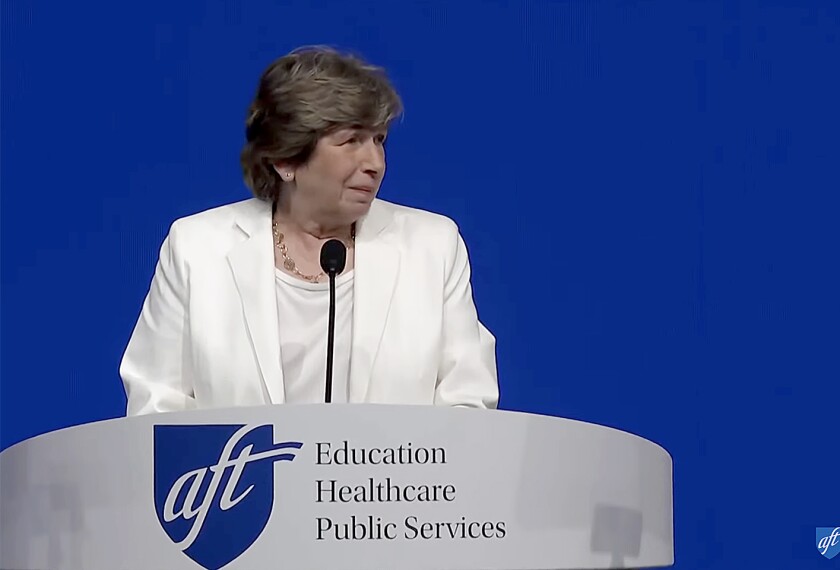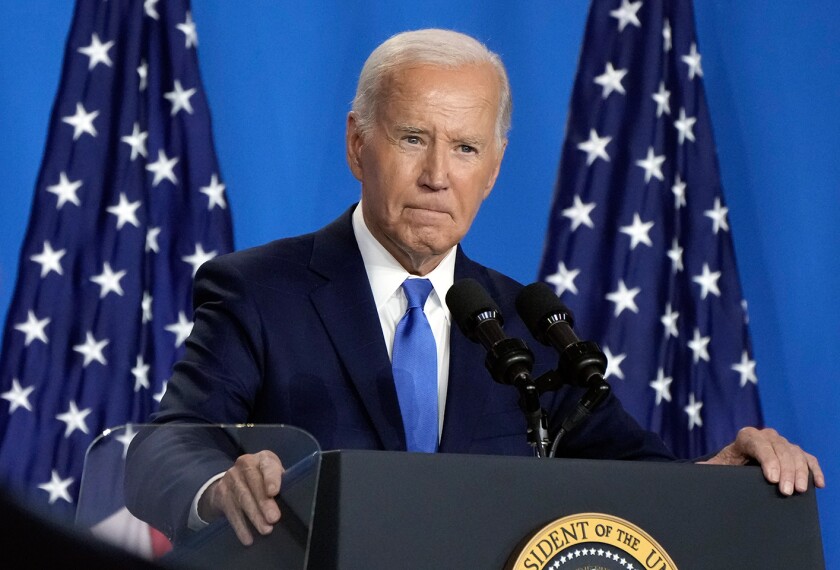The six states that now have federal approval to change the way they hold schools accountable under the No Child Left Behind Act will use six different ways to distinguish between schools with minor problems and those that need total overhauls.
The variety of approaches will help inform Congress when it resumes debate over reauthorizing the NCLB law in 2009, and help it address complaints that the current law doesn’t offer enough flexibility to decide what actions states and districts may take in addressing individual schools’ needs.
For blog coverage on the reauthorization of No Child Left Behind, read NCLB: Act II.
“I’m hopeful that they will build on this progress by creating effective new strategies that we can share and take to scale,” U.S. Secretary of Education Margaret Spellings said this month in announcing that she had approved Florida, Georgia, Illinois, Indiana, Maryland, and Ohio to take part in the “differentiated accountability” pilot project.
But Ms. Spellings also said she was discouraged that many other states had failed to take up the challenge to change the way they intervene in schools failing to make adequate yearly progress under the 6 1/2-year-old NCLB law.
“We need more states to be pioneers in advancing positive change,” Ms. Spellings said July 1 in a speech at the Education Commission of the States’ annual conference in Austin, Texas, where she announced the six states approved for the pilot project.
One official representing states isn’t surprised, though, that states weren’t willing to rewrite their accountability systems to participate in the pilot project—one of several initiatives Ms. Spellings has introduced this year because Congress has postponed its effort to reauthorize the law.
“I don’t think any of them saw this as the chance to do groundbreaking stuff,” said David Griffith, the director of government relations for the National Association of State Boards of Education, based in Alexandria, Va. “This was just a token flexibility that was being offered and something that the next [presidential] administration may or may not keep.”
Other critics suggest that the plans Secretary Spellings approved would undermine the NCLB law’s requirement that schools be held responsible for student achievement across various demographic groups.
“This is giving some slack to suburban schools that are failing in some subgroups,” said Chad Aldeman, a policy associate for Education Sector, a Washington-based research group. “I understand the need for flexibility, but at the same time it’s watering the law down.”
An Education Department official said that the plans wouldn’t relieve schools of the law’s requirement that they disaggregate data for subgroups, or of the need to address the achievement problems of students in subgroups, such as ethnic minorities and students with disabilities.
“The power of disaggregation is still there,” said Kerri L. Briggs, the assistant secretary for elementary and secondary education. “There is no case where a school is in need of improvement and nothing happens.”
In Search of Innovation
Seventeen states applied to join the differentiated-accountability project, which Ms. Spellings proposed in response to complaints that the NCLB law creates a one-size-fits all accountability system.
Federal officials were satisfied with the rigor of the six plans that won approval. But most states didn’t propose significant changes to the way they hold schools accountable or creative ways to intervene in schools based on their particular needs, according to the panel of 15 researchers, policy advocates, and state officials that reviewed the applications.
“The methods appeared largely to be based on methods of convenience rather than a focus on the underlying causes of schools inability to meet AYP,” the panel wrote, summarizing its review of the states’ plans.
The Education Department will offer states the chance to reapply for the program this fall and will select as many as four more to participate by the end of the year, Ms. Briggs said.
Some states “needed more time to put their proposals together,” she said in an interview. “We are really looking for innovation and want to see more intensity in states’ improvement efforts.”
I'm hopeful that they will build on this progress by creating new strategies that we can share and take to scale. ... We need more states to be pioneers in advancing positive change.
When Ms. Spellings introduced the differentiated-accountability pilot, she said states that qualified could alter the way they intervene in schools that fail to meet their annual achievement goals under the NCLB law, which seeks to assure that all students are proficient in reading and mathematics by the end of the 2013-14 school year. Annual testing in those subjects in grades 3-8 is the key measure of progress.
Schools that don’t make adequate yearly progress, or AYP, for two years straight are required to offer students the chance to transfer to other public schools in the district. After three years of falling short, the schools must arrange for free tutoring—known as supplemental educational services, or SES. In later years, districts choose from more aggressive action, such as changing curricula, installing new leadership, or using a comprehensive reform strategy.
The law requires districts to take the same steps in every school regardless of how far short a school fell of the law’s achievement goals or whether it missed a goal in one or all of the demographic subgroups in which each school must show progress.
State Authority
States selected for the pilot program took distinctive approaches to refining their accountability systems, Ms. Briggs said. One common theme, though, was that they all expanded the state role in overseeing and intervening in struggling schools, she added.
Georgia’s plan will divide schools into three groups, based on how far each school is from meeting the AYP goals. For schools farthest from their goals, state officials will take away school district officials’ authority to decide which interventions are appropriate for the schools. Among the state officials’ options will be to appoint a person to develop a plan to help each of the schools reach its AYP goals or convert the school to a charter school.
The Maryland State Department of Education will create a “breakthrough center” that will become the resource helping chronically underperforming schools devise their improvement plans, said Nancy S. Grasmick, the state superintendent of schools.
“Pulling all of the expertise and resources together to give intense technical assistance and resources to these schools is going to be an immense asset,” Ms. Grasmick said. “This way, we’re going to be more strategic on how we use our resources to turn around our schools.”
More Than Switching
The federal Education Department rejected several states that applied for the program because they would not have made radical changes to their accountability plans. Several states’ most significant proposal was to switch the order in which supplemental services and school choice are offered in schools failing to make AYP.
“That’s just not going to fly,” Ms. Briggs said. “This is about focusing on schools that need to improve.” However, the department is reviewing plans from several states under a different flexibility initiative that would allow such a switch.
But most states weren’t prepared to radically change what they’re doing, said Mr. Griffith of NASBE, the group that represents state school boards. State officials are struggling to carry out the federal law as it’s currently written, he said, and don’t want to introduce changes now. Congress is likely to reauthorize the NCLB law before many of the changes in the pilot project are fully implemented and may choose to make major changes to the way schools are held accountable, Mr. Griffith said.
“How many hoops do they want to jump through at this point,” he said, “when it’s going to be reauthorized?”




